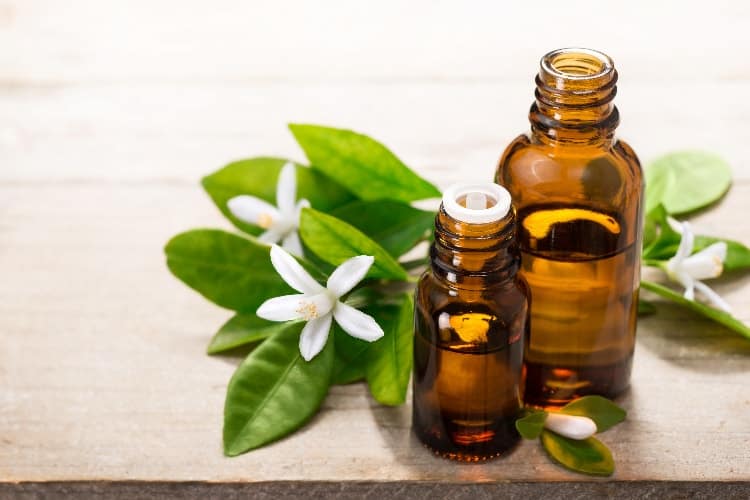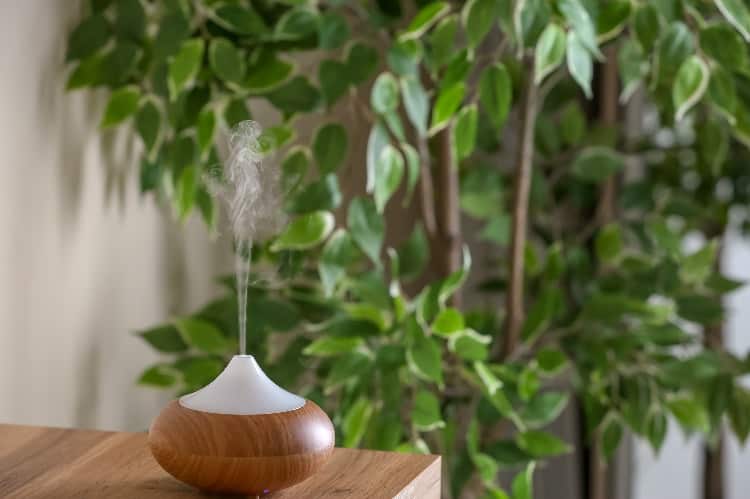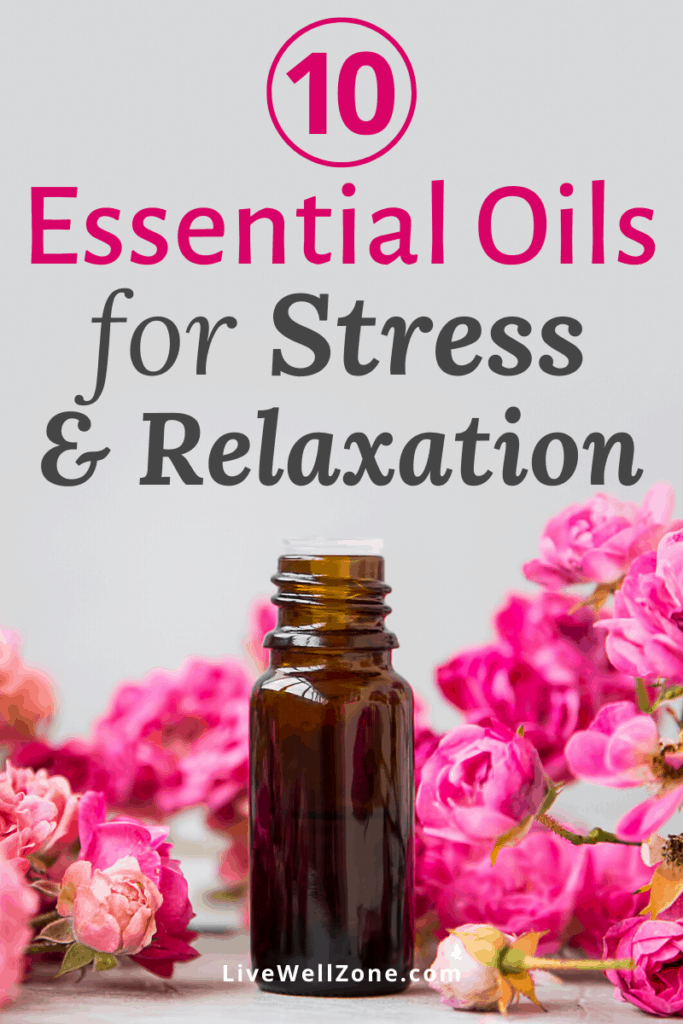
In many ways reducing stress and tension is an art form that requires a holistic approach. And one aspect of that holistic approach is to use essential oils for stress relief.
Essential oil therapy (aka aromatherapy) is based on the idea that scents have a direct impact on our mood.
Yeah, nothing surprising there, right?
After all, different scents can trigger memories of grandma’s cooking, an ex-spouse’s cologne, or a previous vacation.
And depending on how we feel about those memories, our mood can instantly change.
So, given that our bodies have such a strong and measurable reaction to scents, it’s not surprising that essential oils can help us get through stressful days.
That’s why this post is all about essential oils that you can use to reduce stress, induce relaxation and create a greater sense of ease.
Let’s get to it!
Note: this post contains affiliate links and I earn a commission (at no additional cost to you) if you use them to make a purchase.
HOW AROMATHERAPY RELIEVES STRESS
When you inhale an essential oil, two main things happen almost simultaneously:
- The olfactory system is stimulated. This system is made of all the organs (like the nose) and cells that relate to our sense of smell.
- The limbic system (aka the emotional brain) is awakened.
The limbic system is crucial to how essential oils work because it’s connected to the parts of the brain that regulate:
- stress levels
- memory
- heart rate
- blood pressure
- breathing rate
- hormones
Given this interconnectedness, it’s no wonder that essential oils can make us feel less stressed and also, reduce stress hormones like cortisol.
10 ESSENTIAL OILS THAT ARE GOOD FOR STRESS AND RELAXATION
Now that we’ve had a quick overview of how essential oils work, let’s look at 10 essential oils for stress reduction.
1. Clary Sage
Clary sage is an essential oil that induces an overall sense of calm and clarity.
It’s also a potent stress reliever and just by inhaling this oil you can reduce cortisol (the main stress hormone) by 36% (source).
In addition, clary sage also:
- lowers blood pressure
- improves depression and anxiety
- boosts brain function by improving alertness and memory
2. Bergamot
Bergamot is a citrus oil with a very refreshing and uplifting scent.
And a 2015 scientific review of several bergamot oil studies concluded that this oil can be “useful to reduce anxiety and stress effects.”
Furthermore, bergamot also has anti-inflammatory properties that reduce pain.
Experiencing less physical can also have a positive effect on overall stress levels.
3. Ylang Ylang
Ylang ylang contains a compound called linalool, which is said to have stress-reducing properties.
In fact, research done on rats shows that linalool not only lowers stress, but it has antidepressant effects and improves social anxiety.
Also, studies confirm that ylang ylang works well whether inhaled or applied to the skin.
4. Neroli
Inhaling neroli oil can cause the brain to release more serotonin (the feel-good hormone) and also reduce cortisol.
And similar to the other oils we’ve looked at, neroli has anti-anxiety and antidepressant capabilities (source).
5. Marjoram
Marjoram has a calming and sedative effect that makes it beneficial for both stress and anxiety.
It also has a balancing effect that allows it to increase feelings of happiness when you’re feeling angry or sad.
6. Lavender
Just like ylang ylang, lavender contains linalool, which is one of the main compounds that makes lavender great for stressful times.
According to the Natural Medicine Journal, lavender oil is effective for managing everyday stress, anxiety and depression.
Furthermore, the journal states that oral supplementation (at 80mg a day) can be similar or eve, superior, to using benzodiazepines (prescription tranquilizers).
7. Myrrh
Myrrh essential oil stimulates various parts of the brain, including the hypothalamus and pituitary glands (source).
The hypothalamus is the master gland that controls everything related to our hormones.
As for the pituitary, it’s the second in command.
The pituitary receives messages from the hypothalamus and then communicates with other organs, like the adrenals (which produces cortisol).
Therefore, myrrh is able to positively impact the pathway that regulates stress and stress hormones in the body.
8. Frankincense
Research done with rats shows that frankincense oil can counteract the negative side effects of stress.
More specifically, frankincense is able to improve sleep quality and help the body maintain its antioxidant levels (which generally decrease as stress increases).
9. Chamomile
Chamomile is a mild tranquilizer that is best known for inducing a sense of calm and relaxation.
A 2011 review of chamomile as an herbal medicine states that inhalation of chamomile oil is recommended for relieving anxiety and general depression.
In addition, the review points out that inhaling chamomile oil reduces a stress-induced increase in ACTH (adrenocorticotropic hormone).
Now, ACTH is a hormone produced by the pituitary gland, which then triggers the adrenals to release cortisol.
So, by regulating ACTH, chamomile helps the body modulate its response to stress.
10. Rose
Studies show that applying rose oil to the skin results improves the levels of various stress-related markers, including:
- Cortisol
- Heart rate
- Blood pressure
- Breathing rate
In addition, study participants also report that rose oil makes them feel more relaxed.
WHERE TO APPLY ESSENTIAL OILS FOR STRESS AND TIPS FOR USING THEM

When it comes to relieving stress with essential oils, you can use them topically (apply to skin or use in bath water) or diffuse them.
When it comes to topical use, here are some tips to keep in mind:
- Always dilute the oils in a carrier oil like almond, jojoba or coconut oil. This minimizes the risk of burns or irritation. Use my essential oil guide dilution guide for more details.
- If your stress is accompanied by headaches, oils like lavender and chamomile are good choices. Massage the diluted oil onto the temples, back of the neck and chest.
- When using essential oils in a bath, always dilute them. One of the easiest ways is to mix 5 – 20 drops of essential oil with 1 tablespoon liquid castile soap. Then add this mixture to your bath water.
Now, when it comes to diffusing essential oils, here are some stress-reducing blends to use.
Blend #1
3 drops frankincense
2 drops ylang ylang
2 drops rose
Blend #2
2 drops each of lavender, ylang ylang, marjoram, chamomile
Blend #3
2 drops each of lavender, ylang ylang, frankincense, clary sage

HOW CAN I DESTRESS NATURALLY?
Aside from using essential oils, there are many other natural remedies that you can use to lower stress.
Here are a few to consider adding to your routine.
Adult Coloring Book
Coloring books are a simple and fun way to teach your mind to focus on one thing (a rarity in our busy, multi-tasking world).
By focusing on one thing you feel less agitated and more calm, while creating something fun and colorful!
Walking Meditation
Next time you go out for a walk, leave your earbuds and other distractions behind.
Instead, notice how the air feels against your skin, the sound of your footsteps and the natural sounds around you.
It doesn’t matter what those natural sounds are – birds on a nature trail or cars honking on a busy street.
Just the mere fact that you are actually present with the sights and sounds of the present moment can help take some weight off your shoulders.
Slow Down Your Exhales
When we exhale at a pace that is slower than the inhale, it’s very soothing to the nervous system.
And more specifically, it calms the sympathetic nervous system (fight or flight response) and activates the parasympathetic nervous system (which takes care of things like rest and sleep).
Since exhales are responsible for activating the parasympathetic system, extending those exhales can lead to a greater sense of ease.
So, find 5 to 10 quiet minutes and practice this simple technique:
- Inhale for a count of 2 (or 3 or 4)
- Exhale for a count of 4 (or 6 or 8)
Unplug
Sometimes you just need to disconnect from all of it.
Friends, family, your insta feed, the news…
If you’re feeling drained or overwhelmed, take a half day, a whole day, or a whole weekend away from everything.
You’ll realize that the world still continues to spin, the sun still shines and you actually feel less tense!
RELATED QUESTIONS
What essential oils are good for sleep?
Vetiver, cedarwood, geranium, lavender and jasmine are a few essential oils that are good for sleep.
To learn more about these oils and to get 20 blends that you can use, read this post on essential oil diffuser recipes for sleep.
How do you know if essential oils are pure?
The only way to know with absolute certainty that oils are pure is to get them tested by a third party lab that specializes in essential oil testing.
As a consumer you can also buy from brands that provide GCMS (gas chromatography–mass spectrometry) reports. Do keep in mind even though GCMS test are an industry standard, they’re not always 100% foolproof. There are other tests that are more accurate and detailed than a GCMS test.
But as a consumer the only quality test that you can get your hands on is a GCMS. And there are resources online that you can use to learn how to read those tests if you want to dive deeper.
Can you mix eucalyptus and lavender oil?
Yes, lavender and eucalytpus blend well together and they can be very helpful for headaches, as well as sore throats.
CONCLUSION
Eliminating all stress from our lives is impossible.
However, we can improve how we react to that stress and how that stress affects us with the help of essential oils.
As with all holistic methods, essential oils work best when used consistently and in combination with other lifestyle changes.
For more ways to reduce stress be sure to check out my collection of self care articles.
I hope this post was helpful and if you have any questions or feedback, drop a comment below!
Related Posts:
Essential oils for Hormone Balance
18 Essential Oils for Sore Throat


